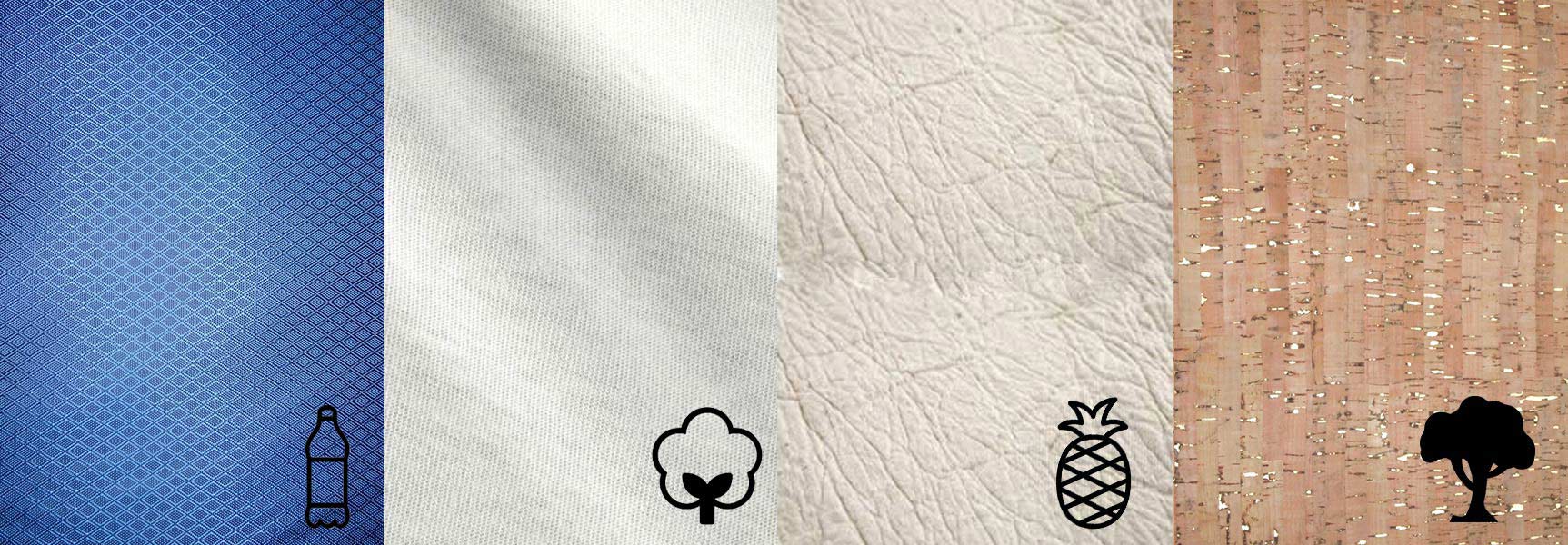Sustainability
Our philosophy is to avoid any unnecessary waste and we are happy to be a manufacture who support growing trend of sustainability.
Our commitment goes to the rational use of natural resources and preventing pollution.
We aim to meet the challenges of our times by developing innovative products in which commercial success is integrated with, and promotes, social, ecological and cultural development.
ONE KEY FEATURE FOR PROMOTING SUSTAINABILITY IS TO WORK WITH SUSTAINABLE MATERIALS LIKE:
Pinatex is a natural, sustainably produced textile that was developed for use as a sustainable alternative to both mass-produced leather and polluting synthetic materials.
Pinatex is made from the leaves of the pineapple plant, the byproduct of the fruit industry. Adding value to this waste has created a new source of income for farming communities who otherwise rely on a seasonal harvest.
Cork fabric is harvested from the Cork Oak tree, a tree that grows primarily in Spain, Portugal and France. When the Cork Oak has reached 20 years of age, the bark is stripped from the tree by a skilled cork harvester with a machete.
Being an all natural product, cork doesn`t leave anything to be desired from its industrial counterparts, quite the contrary. Because of its flexibility, it can easily replace harmful and pollutant materials, like plastic, in the production of everyday objects, such as quality, vegan purses, handbags, wallets and accessories for men and women.
Cork fabric is the natural and sustainable vegetable leather you`ve been looking for:it looks like leather, but it comes from a tree.
Cotton is a natural fiber which is renewable and biodegradable. It has become an inevitable part of one's living, which is why it is also called "fabric of our lives". Mankind has been using cotton for the last 7000 years on a daily basis for different purposes. However, conventional cotton has huge environmental impacts, which have lead the cotton industries globally shift to a sustainable choice- organic cotton.
Organic cotton means cotton that is grown without using harmful pesticides, chemicals and synthetic fertilizers. The methods and materials used in organic cotton farming maintain soil fertility and reduce negative impacts on rivers and fresh water sources close to the cotton farms. Further, organic cotton production does not use genetically modified (GM) seeds.
Recycled polyester, also known as rPET, is obtained by melting down existing plastic and re-spinning it into new polyester fiber. While much attention is given to rPET made from plastic bottles and containers thrown away by consumers, in reality polyethylene terephthalate can be recycled from both post-industrial and post-consumer input materials. But, just to give an example, five soda bottles yield enough fiber for one extra large T-shirt.
Sustainable fashion, also called eco fashion, is a part of the growing design philosophy and trend of sustainability, the goal of which is to create a system which can be supported indefinitely in terms of human impact on the environment and social responsibility. It can be seen as an alternative trend against fast fashion.
As much as we love leather, we also love the innovative spirit of these times in which alternative sustainable materials are created from pineapple leaves, and
other organic, natural ingredients.
ENVIRONMENTALLY RESPONSIBLE
By changing practices, the fashion industry can stop its negative impact.
So, what are we doing about it?
- Using a sustainable natural material like pinatex, organic cotton, cork, recycyled polyester;
- Minimizing the use of virgin polyester;
- Using non-toxic water-based inks;
- Using water reutilization systems.
- Sourcing and manufacturing locally.
- Making items by hand and in small batches.
- Designing for longevity and durability.
- Keeping our packages simple.

